Key takeaways:
- Price comparison involves evaluating value beyond just cost, considering features, warranties, and hidden fees.
- Negotiating prices can lead to significant savings and boosts consumer confidence; preparation and research are essential.
- Building rapport with sellers and timing negotiations strategically can enhance the chances of securing better deals.
- Following up after negotiations fosters relationships and can sometimes result in additional discounts or insights for future interactions.
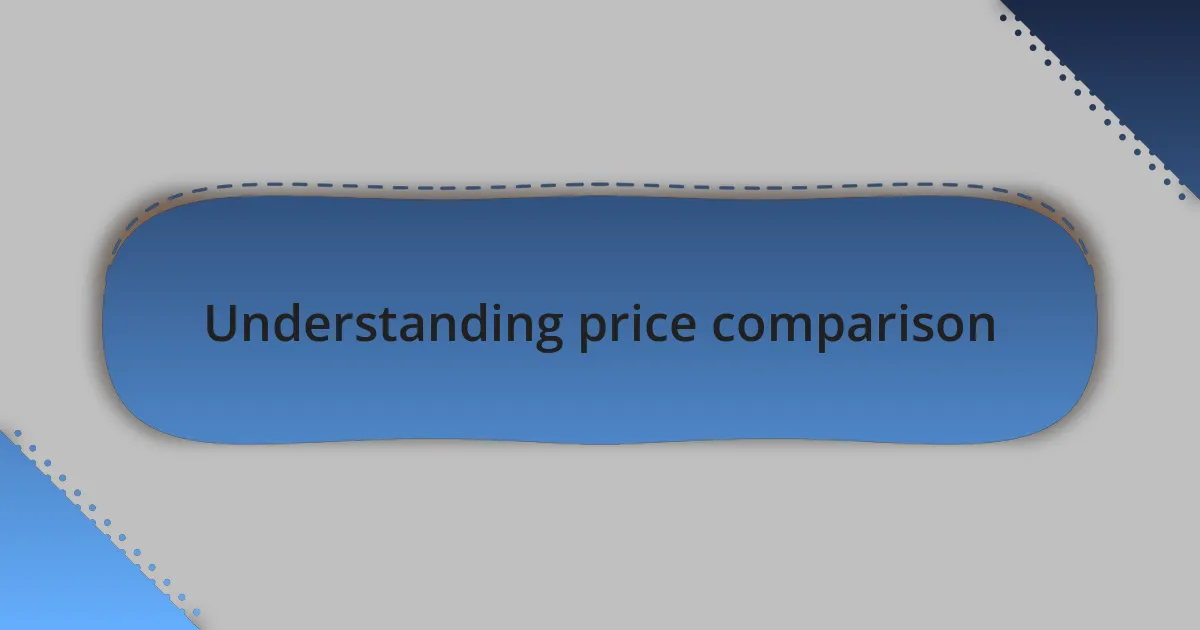
Understanding price comparison
Price comparison is about more than just finding the lowest cost; it’s about understanding the value you’re getting for that price. I remember a time when I was shopping for a new laptop. I found two options that seemed similar in price, but one came with a three-year warranty while the other had just a year. That extra coverage made a significant difference in my decision-making process.
When you dig into price comparisons, it’s essential to consider hidden costs and features that may not be immediately apparent. I once overlooked the fine print on a subscription service, thinking I was getting a deal. It turned out that the renewal price was much higher than I anticipated. This experience taught me the importance of looking beyond the surface to truly understand what I’m paying for.
Moreover, have you ever wondered why some prices seem too good to be true? I learned that sometimes, retailers offer lower prices to attract customers, only to compensate for it with upsells or added fees down the line. Being aware of these tactics can empower you as a shopper, ensuring you make informed decisions rather than impulsive purchases.
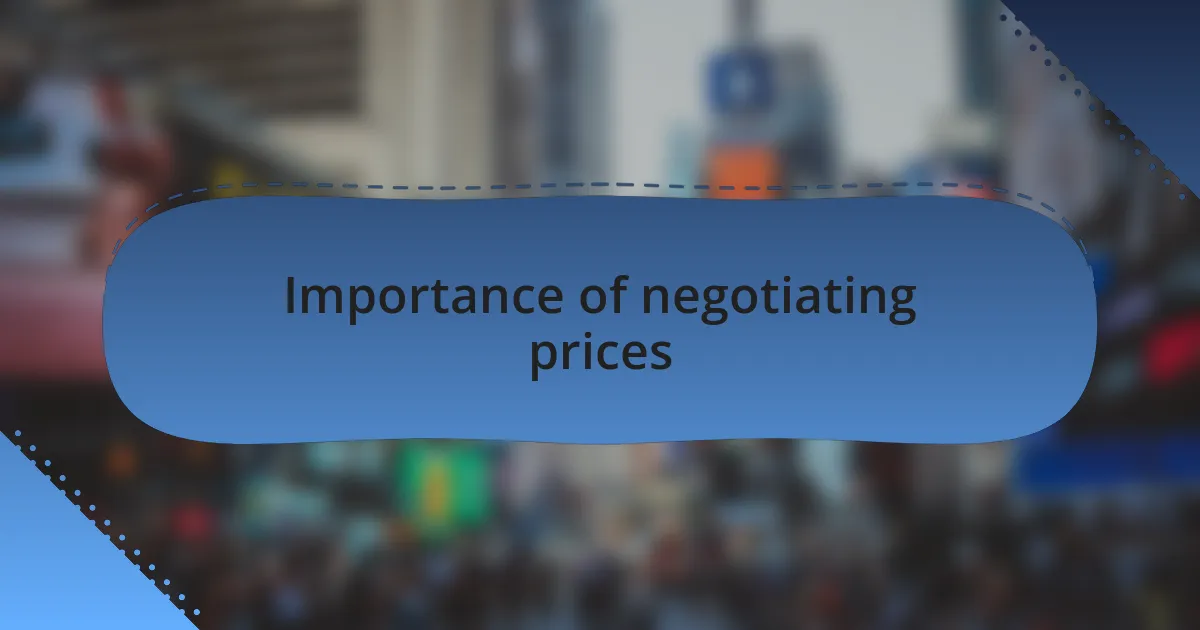
Importance of negotiating prices
Negotiating prices is crucial because it can lead to significant savings and better value for your money. I recall a time when I was buying a car; by simply asking the salesperson for a discount, I managed to save a couple of thousand dollars. This experience solidified my belief that discussing prices openly is not only beneficial but also expected in many purchasing situations.
When you negotiate, you’re not just haggling over numbers; you’re advocating for your worth as a consumer. Sometimes, I enter a bargaining situation with a sense of excitement, wondering what I can achieve through a simple conversation. It’s empowering to realize that the price isn’t set in stone and that, with the right approach, buyers can influence costs.
Many people shy away from negotiating because they fear rejection or feel uncomfortable asking for less. But I’ve learned that most sellers anticipate negotiations and often have some wiggle room in their pricing. Can you imagine the feeling of empowerment when you walk away knowing you’ve secured a better deal? It’s an uplifting experience that can enhance your purchasing confidence and inspire future negotiations.
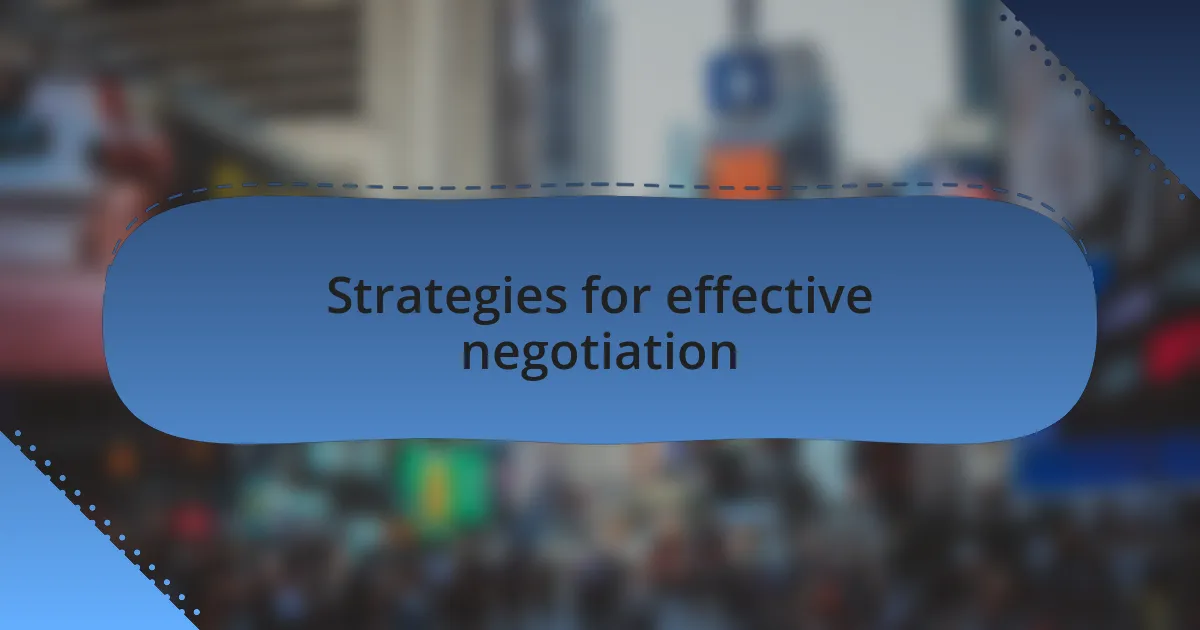
Strategies for effective negotiation
When I step into a negotiation, I always come prepared with research on the price range for the item I’m considering. For instance, I once negotiated for a new laptop, and knowing the average market price gave me a solid foundation to discuss. With that information, I felt confident asking for a better deal, and the seller was more receptive to my requests.
Another strategy I’ve found effective is establishing rapport with the seller. It reminds me of a time when I casually chatted with a vendor while shopping for furniture. By building a connection, I not only made the interaction more enjoyable but also gained insights into their pricing structure, which ultimately helped me secure a significant discount. Isn’t it remarkable how a little friendliness can open the door to better prices?
Timing can be everything in negotiation. I’ve learned to approach sellers during off-peak times, when they might be more willing to negotiate. For example, I once took advantage of a slow weekday at a car dealership, and the salespeople were eager to make a sale. This experience taught me that the timing of my approach can greatly affect the outcome; a strategic mindset can lead to unexpected savings.
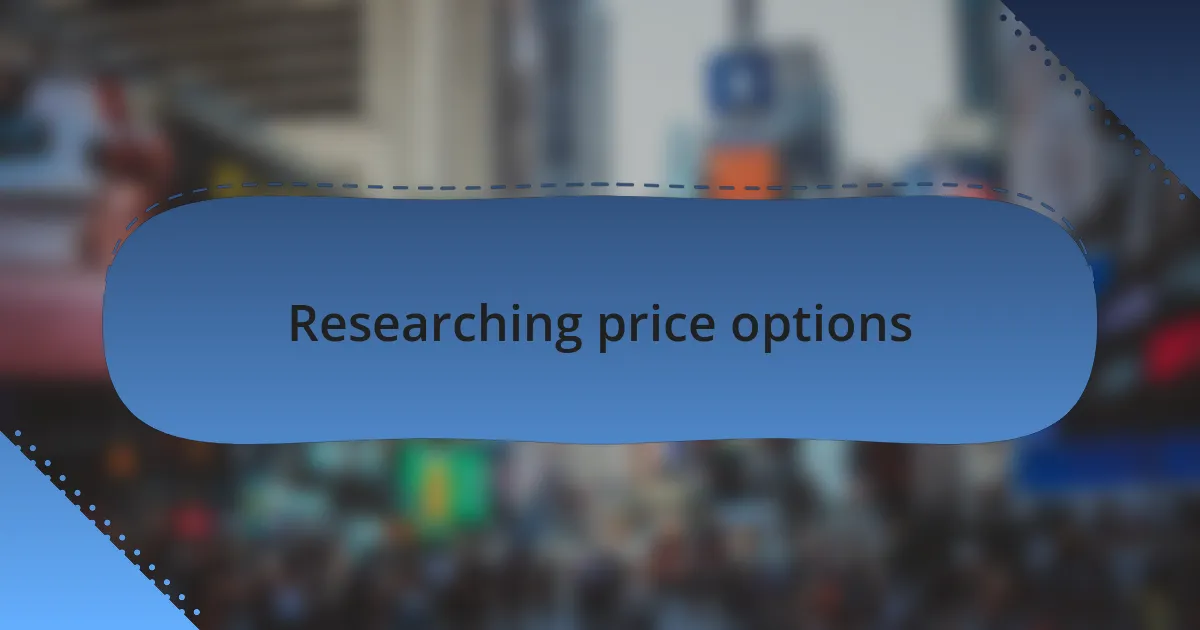
Researching price options
I always start my price research by exploring multiple platforms and comparing prices. For example, when I was looking for a new camera, I scoured various websites and local retailers to see how prices varied. This not only gave me a clear picture of the market but also armed me with enough data to negotiate confidently. Have you ever noticed how dramatically prices can differ between stores?
Diving deeper into customer reviews is another key step I take. While researching for a recent gadget purchase, I stumbled upon user feedback highlighting not just price, but also product value. Realizing that some models offered features that justified higher prices helped me shift my negotiation strategy. It’s fascinating how informed customers can leverage these insights to negotiate with more authority.
Lastly, I invest time in understanding seasonal trends. For instance, I’ve found that waiting for holiday sales often yields fantastic deals. I remember holding off on buying a new mattress until a major sales event, which ultimately saved me hundreds. Isn’t it empowering to plan purchases around timing, knowing it can lead to significant savings?

Personal experiences in negotiation
When it comes to negotiating for better prices, I recall a time when I was looking for a used car. I found one that seemed perfect, but the price was higher than my budget. After chatting with the seller and sharing comparable listings I had found, I sensed a shift in their stance. It felt rewarding to know that my preparation and understanding of the market made a difference in their willingness to budge. Have you ever experienced that rush when you see someone reconsider a price because of your insights?
Another memorable negotiation happened when I was shopping for furniture. I had my eyes on a stylish sofa that was just outside my price range. I took a deep breath, approached the sales associate, and politely expressed my concerns about the price. By quoting other retailers and showing genuine interest in the item, I was able to negotiate a discount that made the purchase feasible. I still remember the sense of accomplishment I had walking out with the sofa, knowing I hadn’t just accepted the first price thrown my way.
There’s also a time when I attempted to negotiate at a local market. I found a beautiful handmade piece of pottery but hesitated at the price. I decided to engage the vendor in a conversation about the craft, expressing my admiration for their work. By simply connecting on a personal level, I not only learned about the item but also felt more comfortable discussing the price. What amazed me was the realization that sometimes, it’s not just about the numbers—building rapport can be a powerful negotiation tool.
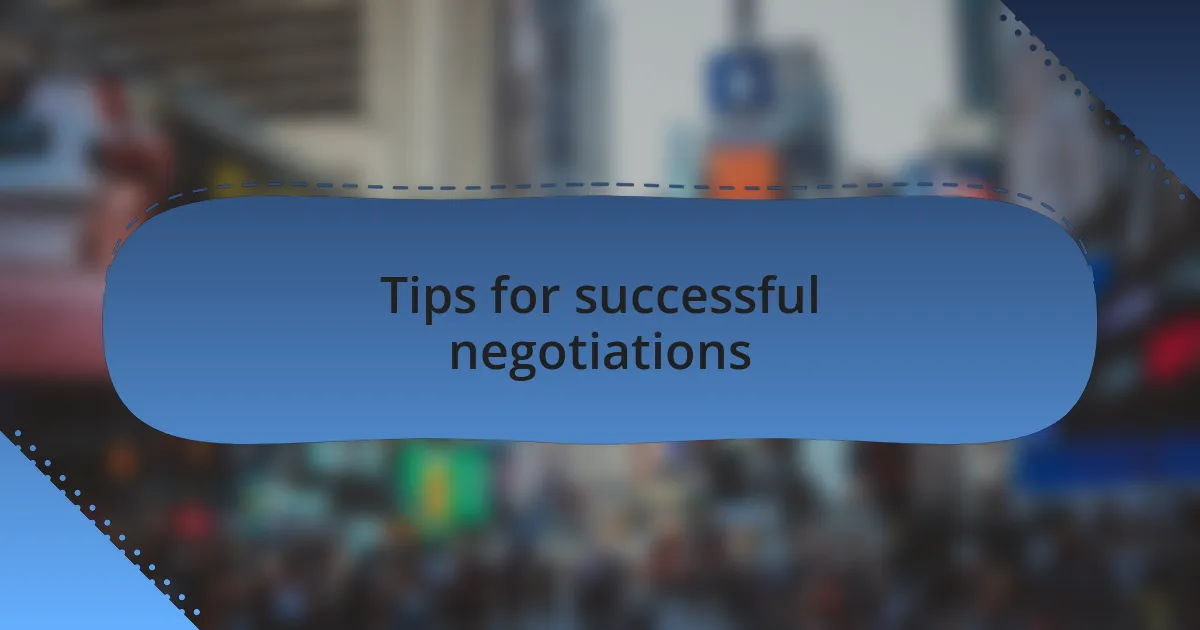
Tips for successful negotiations
When you’re negotiating, preparation truly is key. I remember a time when I went to buy a new laptop. I had done my homework, comparing prices and specs across various retailers. Walking in with this knowledge made me feel confident; I could reference specific models and pricing that I had found elsewhere. This strategy not only impressed the salesperson but also gave me a solid foundation for discussion. Have you ever felt that kind of readiness transform a conversation?
Something that struck me during a recent negotiation at a flea market was the impact of tone and body language. I approached a vendor selling vintage records, excited but also aware that many of the items were above my budget. Instead of leading with a hard bargain, I engaged in light banter about music and shared my personal connection to some of the albums. This friendly exchange created a comfortable atmosphere, allowing me to negotiate a better price without feeling confrontational. Isn’t it fascinating how shifting the vibe can lead to unexpected results?
Another lesson I learned is the power of silence. During a recent negotiation with a contractor for home repairs, I initially offered a price that was lower than expected. Instead of immediately following up with justifications, I paused, allowing the contractor to respond. That silence encouraged them to reconsider their pricing, and soon I found myself with a much better deal. Have you ever experienced that moment of silence lead to more than just awkwardness? It can really open up a dialogue!
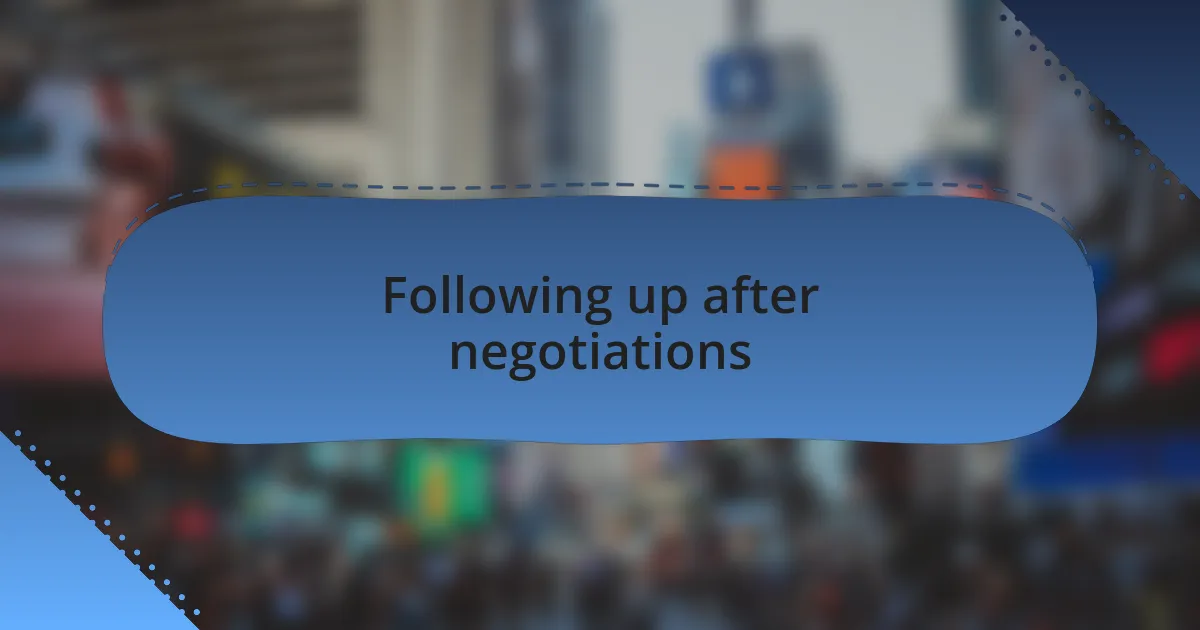
Following up after negotiations
Following up after negotiations is just as crucial as the negotiation itself. After striking a deal for a used bike recently, I made it a point to send a thank-you email to the seller. Not only did this simple act express my appreciation, but it also laid the groundwork for any future transactions. Have you ever thought how a little follow-up can nurture a relationship? It can keep doors open for better deals later on.
I find it helpful to revisit the conversation after a few days, especially if the negotiation didn’t end with the ideal outcome. In one instance, I reached out to a software provider who initially declined to match a competitor’s price. By reiterating my interest and asking if they could reconsider, I discovered they were willing to offer a small discount just to keep my business. It’s interesting how persistence can sometimes turn a “no” into a “maybe,” isn’t it?
In my experience, following up can also provide valuable insights. I once negotiated for carpet cleaning services and decided to ask the provider for feedback on my negotiation approach. Their response revealed not just what worked but also areas I could improve. This feedback loop turned out to be an enlightening experience, encouraging me to refine my skills for future negotiations. Have you ever asked for input after a negotiation? It can be a rich source of growth.